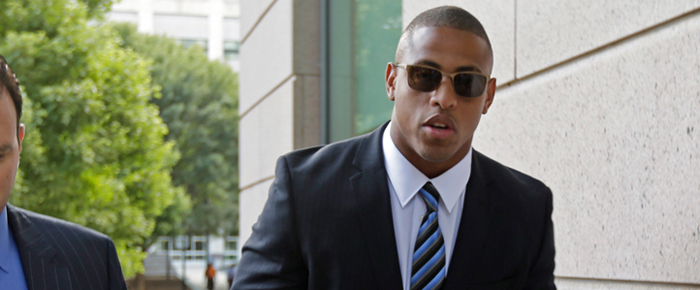
By Julie Buehler
The videotape TMZ released showing Ray Rice striking his then-fiancé inside an Atlantic City elevator not only changed the way we look at the NFL, it changed the way we look at innocence. Or lack thereof.
Because Rice’s offense assaulted our national consciousness on that video tape, perhaps more than any other domestic violence case in sports history, the fact the criminal justice system, the fact the laws of the land allowed Rice to go to counseling and maneuver past his transgression with relative ease has largely been lost in the shuffle. But that’s the key to effecting actual change for real domestic violence vicitms.
But rather than seek actually change to the damaging laws, most in the media simply assign guilt and proclaim a person a pariah for the punishment.
I prefer having stronger laws and more substantial consequences for abusers.
But nowadays, in a world of instant gratification, that whole “innocent until proven guilty” might work in front of a jury of your peers, but it’s not going to work in the court of public opinion.
We now live in a world that guilt is assigned, not proven. And thus, it’s often arbitrarily stapled to an athlete, somewhat based on the timing of a news cycle and certainly based on the grandeur of the voice announcing suspicions. But rarely are the facts of a case examined with care or honest analysis without supposition.
The Mueller report, examining the NFL’s investigation into the Ray Rice debacle, found the NFL failed to see the connections and investigate thoroughly enough because it relied on the criminal justice system to do most of the work for it.
Which, if you, as an American citizen, would prefer the age-old paradigm of presumed innocence to be the one under which you are judged, you’d understand why the NFL sought to allow that presumption to color their own disciplinary process.
We are on a very slippery slope and I’m concerned we’re about to go careening down it sooner than later.
Because reality is, there’s far too much money and far too much focus on NFL players, or professional athletes in general, and the laws on domestic violence far too soft that that standard is sufficient for those making money off the public good will.
I’m NOT saying the “innocent until proven guilty” premise is incorrect, it’s not, and as Americans, we must protect that at all costs.
But for athletes who make a living off the good will of sports fans it’s not asking too much that they be held to an exceptionally high standard of conduct in their professional life and personal life.
That means, yes, in today’s media, whether you agree with it or not, athletes who find themselves in issues of domestic violence or sexual violence may be found guilty until they prove their innocence.
If athletes understand that reality, they are less likely to be the victim of a potential predatory individual that would be sick enough to make false accusations.
And this means even though the charges against Greg Hardy were technically dropped by North Carolina courts, his guilt is as substantial as the assault he levied on his girlfriend as outlined in the police report.
Generally, I presume innocence until provided evidence of guilt. Generally, I offer people, even those in the public eye, the benefit of the doubt and until they prove me wrong, I’ll continue to do so.
But the case with Greg Hardy isn’t a hard one or complicated. This has to do with the laws in a region hinging prosecution of domestic violence on the bravery of the victim. Reading the police report, which is not fact, but simply an account of what happened, reads like a horror novel. If half of what’s alleged in the police report is true, Hardy should never take another million-dollar snap, but instead, have to earn a hard living in a jail cell.
Problem is, with the Hardy case, a civil lawsuit was settled and the Hardy victim became “intentionally unavailable” to prosecutors looking to ensure the guilty verdict leveled against Hardy by a judge would stick. She obviously got a financial settlement that she deemed sufficient to move on and did so.
But according to the police report, Hardy made Rice look like a small-time offender and having been found guilty once, the NFL must take a hard look at the man and decide if they want to allow him to play football again.
I’m not saying it’s right, but it is a reality.
In the world of sports now, “innocence” is relative and guilt is assigned.
The NFL has the power to do something the North Carolina legal system couldn’t do. And they must.
Julie Buehler hosts the Coachella Valley’s most popular sports talk radio show, “Buehler’s Day Off” every day from 1-4 on 1010 KXPS, the valley’s all sports station. She can also be seen every morning between 6-7am on KMIR sharing the coolest stories in sports. She’s an avid gym rat, slightly sarcastic and more likely to recite Steve Young’s career passing stats than American Idol winners. Tune in M-F 3-6 pst at www.team1010.com or watch “Buehler’s Day Off” on Ustream and KMIR.com for her sports reports.












































